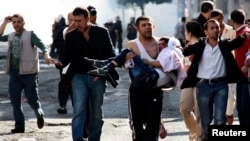With the threat of the Syrian Kurdish city of Kobani falling to the Islamic State extremist group, Turkey is witnessing violent protests by its Kurdish minority who say the Turkish government is failing to intervene.
Violent protests erupted a second day as Turkish Kurds demonstrate against what they say is Turkey’s failure to stop Islamic State fighters advancing on the mainly Kurdish town of Kobani just across the Syrian border.
Police continue to use tear gas to break up many of the protests. On Tuesday several demonstrators were injured - some seriously - after being struck by tear gas canisters.
Many of Turkey’s cities have witnessed these confrontations. The Turkish Minister of Interior, Efkan Ala, has promised a firm response.
"Violence will be responded to. This eclipse of reason should be ended immediately and streets should be emptied," he said. "Otherwise this issue will have unforeseen results. Those who are resorting to violence are engaging in treason."
The most violent confrontations have been in the country’s predominantly Kurdish southeast. At least 18 protesters were killed, according to local news agencies.
Most of the deaths are being blamed on armed, radical supporters of Islamic State clashing with the pro-Kurdish protesters.
Turkey’s largest Kurdish city Diyarbakir, along with six provinces, are under indefinite curfew with soldiers on the streets.
Selahattin Demirtas, leader of the pro-Kurdish People’s Democracy Party, says the protests are only aimed at ending the danger of a massacre in Kobani.
"Kurds demand a change in Turkey's policy and want the Turkish government to officially offer support to Kobani," he said. "This is what lies below our demands. But the government has a political approach not to understand this. They have a crippled mindset."
Kurdish leaders in Turkey, Syria and Iraq are calling on Ankara to open up a land corridor from other Syrian and Iraqi Kurdish regions to allow Kobani to be resupplied with ammunition and heavy arms.
But observers say Ankara remains deeply suspicious of the Syrian Kurdish enclave, fearing it could incite its own restive Kurdish minority.
The Turkish government accuses the Syrian Kurdish enclave of aligning itself with Turkey’s Kurdish rebel group the PKK, which has been fighting for Kurdish minority rights for three decades.
For now, an uneasy peace process is continuing between the PKK and Ankara. But PKK leaders have warned if Kobani falls to the Islamic State jihadists, it will end the peace process. Ankara has dismissed such warnings as rhetoric, saying there is sufficient momentum to sustain the two-year-old peace process whatever the outcome in Kobani.
But Kurdish expert and political columnist Kadri Gursel of the Turkish newspaper Milliyet warns Ankara’s confidence may be misplaced.
"It's a precarious situation because as long [as] there will be armed units in the mountains, there is a potential of armed conflicts, and clashes too," he said.
Anger among Turkey’s Kurds was exacerbated by a tweet by a former deputy prime minister and parliamentary deputy, Emrullah Isler. On his Twitter feed he suggesting his preference for jihadists over the PKK. The tweet was withdrawn following widespread condemnation.
For now the U.S.-led coalition is stepping up its airstrikes against Islamic State forces attacking the Syrian Kurdish city. But, with Kobani’s Kurdish fighters warning they are running out of ammunition, pressure on Ankara to intervene is expected to grow.













